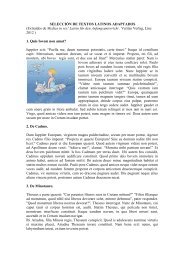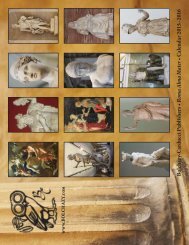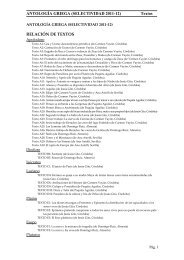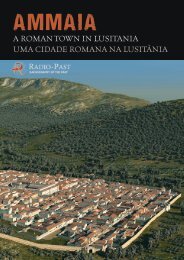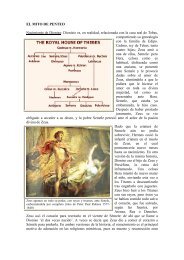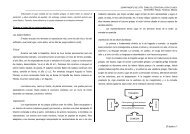www.BOLCHAZY.com
2016-2017RomanCalendar
2016-2017RomanCalendar
You also want an ePaper? Increase the reach of your titles
YUMPU automatically turns print PDFs into web optimized ePapers that Google loves.
Visit us online<br />
<strong>www</strong>.bolchazy.<strong>com</strong><br />
Sententia Latina ad Diem<br />
1. Vitia nostra regiōnum mūtātiōne nōn fugimus.<br />
We do not flee our vices by changing our location.<br />
(Anon.)<br />
2. Sē damnat jūdex, innocentem quī opprimit.<br />
The judge who punishes an innocent man<br />
condemns himself. (Publilius Syrus)<br />
3. Male sēcum agit aeger, medicum quī hērēdem<br />
facit.<br />
The sick man who makes his doctor his heir does<br />
himself a disservice. (Publilius Syrus)<br />
4. Thēsaurum in sepulchrō pōnit, quī senem<br />
hērēdem facit.<br />
Who makes an old man his heir puts his treasure<br />
in the grave. (Publilius Syrus)<br />
5. Ubī peccat aetās major, male discit minor.<br />
When the older generation makes mistakes, the<br />
younger generation learns bad habits. (Publilius<br />
Syrus)<br />
6. Ubī jūdicat quī accūsat, vīs, nōn lēx, valet.<br />
Where the person who accuses is (also) the<br />
person who judges, violence, not law, prevails.<br />
(Publilius Syrus)<br />
7. Perīc’la timidus etiam quae nōn sunt videt.<br />
The timid person sees even dangers that do not<br />
exist. (Publilius Syrus)<br />
8. Ovem in fronte, vulpem in corde gerit.<br />
He acts like a sheep in his face but like a fox in his<br />
heart. (Medieval)<br />
9. Damnant quod nōn intellegunt.<br />
They condemn what they do not understand.<br />
(Anon.)<br />
10. Quī fugit molam, fugit farīnam.<br />
Who runs away from the millstone, runs away<br />
from the flour. (Anon.)<br />
11. Stultus nīl cēlat: quod habet sub corde revēlat.<br />
The stupid person conceals nothing: he reveals<br />
what he has in his heart. (Medieval)<br />
12. Vespere prōmittunt multī quod māne recūsant.<br />
Many promise in the evening what they refuse<br />
the next morning. (Medieval)<br />
13. Occāsiō aegrē offertur, facile āmittitur.<br />
Opportunity is presented rarely, and is easily lost.<br />
(Publilius Syrus)<br />
14. Male agitur cum dominō quem vīlicus docet.<br />
It goes badly with a master whom the foreman<br />
instructs. (Anon.)<br />
15. Quidquid fit cum virtūte, fit cum glōriā.<br />
Whatever is done with courage is done with glory.<br />
(Publilius Syrus)<br />
16. Sub nive quod tegitur, dum nix perit, omne<br />
vidētur.<br />
Everything that is covered by snow appears when<br />
the snow disappears. (Medieval)<br />
17. Nec temere nec timidē.<br />
Neither rashly nor timidly. (Family motto)<br />
18. Omne solum fortī patria est.<br />
Every country is a native land for one who is<br />
brave. (Ovid)<br />
19. Meus mihi, suus cuique est cārus.<br />
Who is mine is dear to me, who is someone else’s<br />
is dear to him. (Plautus)<br />
20. Aliud vīnum, aliud ēbrietās.<br />
Wine is one thing, drunkenness is something<br />
else. (Anon.)<br />
21. Quī parcē sēminat, parcē et metit.<br />
Who sows sparingly also reaps sparingly. (St.<br />
Paul)<br />
22. Nūllus agentī diēs longus est.<br />
No day is long for the person who is active.<br />
(Seneca)<br />
23. Mors omnibus īnstat.<br />
Death threatens all. (Common grave inscription)<br />
24. Cinerī glōria sēra venit.<br />
Glory <strong>com</strong>es late to the ashes. (Martial)<br />
25. Nūllī est hominī perpetuum bonum.<br />
There is eternal prosperity for no man. (Plautus)<br />
26. Nōn est vir fortis ac strēnuus quī labōrem fugit.<br />
The person who runs away from hard work is not<br />
a brave and active man. (Seneca)<br />
27. Quālis dominus, tālis et servus.<br />
As the master is, so is the servant. (Petronius)<br />
28. Fēlīx, quem faciunt aliēna perīcula cautum.<br />
Happy is the person whom other people’s dangers<br />
make cautious. (Medieval)<br />
29. Quem amat, amat; quem nōn amat, nōn amat.<br />
Whom he likes, he likes; whom he does not like,<br />
he does not like. (Petronius)<br />
30. Nōn omnis quī sapiēns dīcitur sapiēns est, sed<br />
quī discit et retinet sapientiam.<br />
Not everyone who is called wise is wise, but<br />
rather he who learns and retains wisdom. (Petrus<br />
Alphonsus)<br />
© 2016 Bolchazy-Carducci Publishers, Inc. For the source of these Latin sententiae and their intended literal English translations, see Lectiones Primae<br />
and Lectiones Secundae in Artes Latinae, published by Bolchazy-Carducci Publishers.



